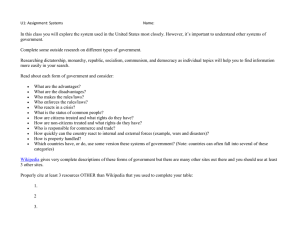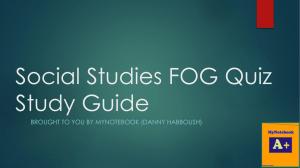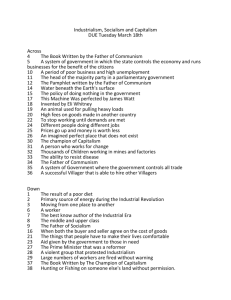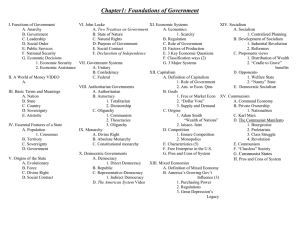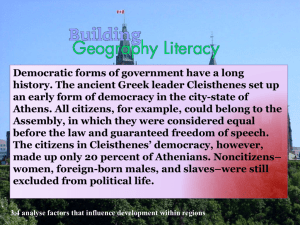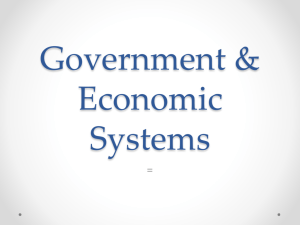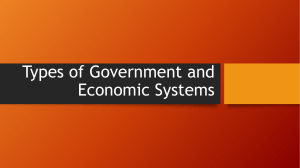Types of Governments
advertisement
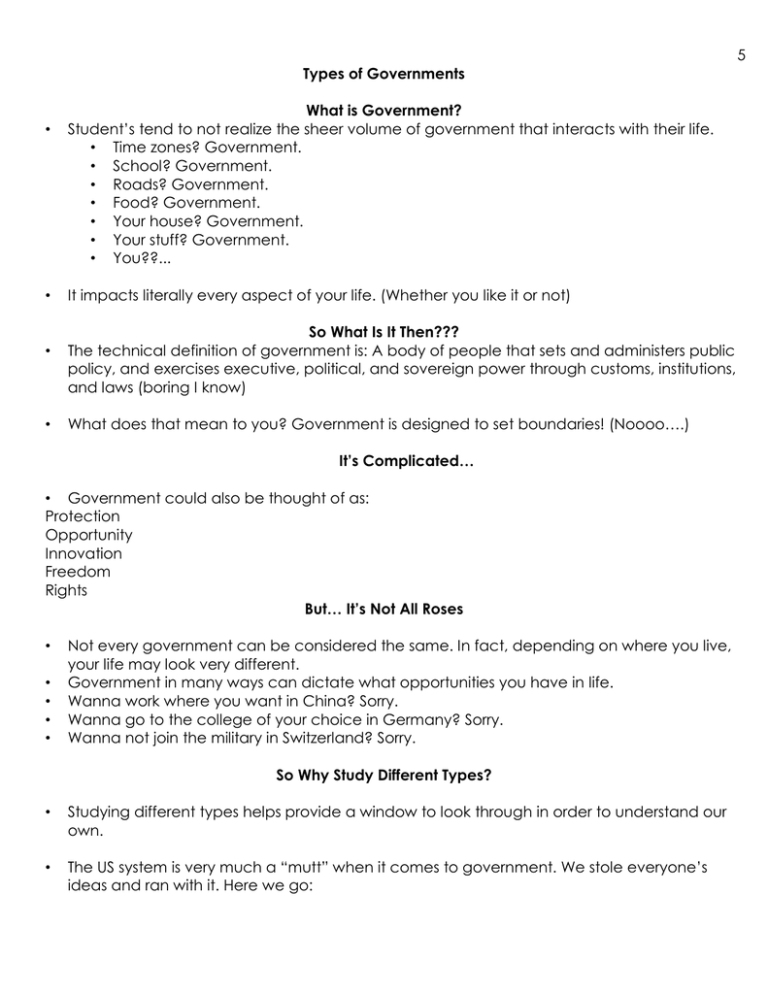
5 Types of Governments • • • • What is Government? Student’s tend to not realize the sheer volume of government that interacts with their life. • Time zones? Government. • School? Government. • Roads? Government. • Food? Government. • Your house? Government. • Your stuff? Government. • You??... It impacts literally every aspect of your life. (Whether you like it or not) So What Is It Then??? The technical definition of government is: A body of people that sets and administers public policy, and exercises executive, political, and sovereign power through customs, institutions, and laws (boring I know) What does that mean to you? Government is designed to set boundaries! (Noooo….) It’s Complicated… • Government could also be thought of as: Protection Opportunity Innovation Freedom Rights But… It’s Not All Roses • • • • • Not every government can be considered the same. In fact, depending on where you live, your life may look very different. Government in many ways can dictate what opportunities you have in life. Wanna work where you want in China? Sorry. Wanna go to the college of your choice in Germany? Sorry. Wanna not join the military in Switzerland? Sorry. So Why Study Different Types? • Studying different types helps provide a window to look through in order to understand our own. • The US system is very much a “mutt” when it comes to government. We stole everyone’s ideas and ran with it. Here we go: 5 ABSOLUTE MONARCHY • As the name implies, their power is absolute King or Queen with all power Most popular form of government in history (maybe just by a different name) Effective: When leader is strong and makes good decisions Ineffective: When leader is selfish, more interested in being fed grapes (their wealth) • Examples? Today: Saudi Arabia CONSTITUTIONAL MONARCHY • • • • Still a King or Queen, but with limits on their power Power usually given to a body of people through a constitution Evolved slowly overtime, not just all at once England is STILL a constitutional monarchy (but the Queen does almost nothing, except college 13 million pounds a year) DICTATORSHIP Hallmark of a dictatorship? A single all powerful leader who controls every aspect of society What’s the difference between this and a monarchy? Not based on royal blood. No family lineage. Often elected, but refuses to give power back Hitler, Stalin, Castro, Mussolini Most times, those who control the military become the dictator (Makes sense right? I have the gun so you listen!) • • OLIGARCHY • Government controlled by a few people! Usually run by the wealthy to continue their own benefit The easiest example of an oligarchy was Sparta, who had two kings. One for military. One for politics. DEMOCRACY (WHICH AMERICA IS NOT) • • • Democracy is often championed as: ‘MURICA’ invented’ We didn’t. Invented by the Greeks 2000 years ago. Demos = People, Kratos = Power. Demos Kratos = People Power One vote per person, on all issues. The US is not a democracy. So… What is it? REPUBLIC (WHICH AMERICA IS!) • America is a Republic. As in: We elect leaders to vote for us. So we don’t have to pay attention! Yay! (wait…) Allows for more efficient government Founding Fathers chose this option because?... Depends on who you ask. Didn’t trust people? Problems with Democracy? 5 ANARCHY Simple, means no government. Some people feel that no government would solve all problems. Often occurs in-between government transitions. Is it bad? ECONOMIC SYSTEMS • Some people often confuse the following as Government systems. However, like most things, government is nothing without money. Each follow one of the following economic systems. Capitalism Socialism Communism CAPITALISM • Americans love capitalism. Why? Provides choice Provides competition Provides nice products for cheap What is it? People create businesses to compete with one another. (You like target? Well there’s WalMart) The people choose the winners and losers (zune anyone?) Reflective on society. Very wealthy v. struggling to get by? No government intervention in the market place (kinda) Helps spread innovation because you are free to make ideas work and benefit the whole. • • • So… SOCIAL…ISM (SOCIALISM!) • A big problem with capitalism is that those people who are struggling… could struggle a lot. • Karl Marx invented Socialism as a way to combat that • Socialism takes property under the control of government, so you don’t control your revenue anymore. Then… they redistribute it to make people equal • The Final Dominoes: Communism and Utopia! Communism is the next step of social. IT IS AN ECONOMIC SYSTEM. • Government controls all goods including the distribution of food, clothes, jobs, housing, cars, or anything that can be bought. Everyone is equal. All taxes are the same. • Benefits? Free education. Healthcare. Food. Housing. Everything is free! • Negatives… how realistic is it really? People are naturally selfish no? Also makes people lazy! Why? Because you have no motivation. You know it is all going to come your way and you can never improve or get worse. The Final Step of Marx? Utopia! You would all agree to share everything and government would cease to exist. Because you wouldn’t need it. • So the end goal of communism? (Marxism) No government, everyone get along! • 5 Lessons to Learn All government blend these together. For example, in times of war, America can resemble a “dictatorship” to benefit the community Japanese internment, Patriot Act • Well… never socialism/communism right? Some goods are strictly controlled by the US such as shipping rates on trains. Social security? Healthcare? •
